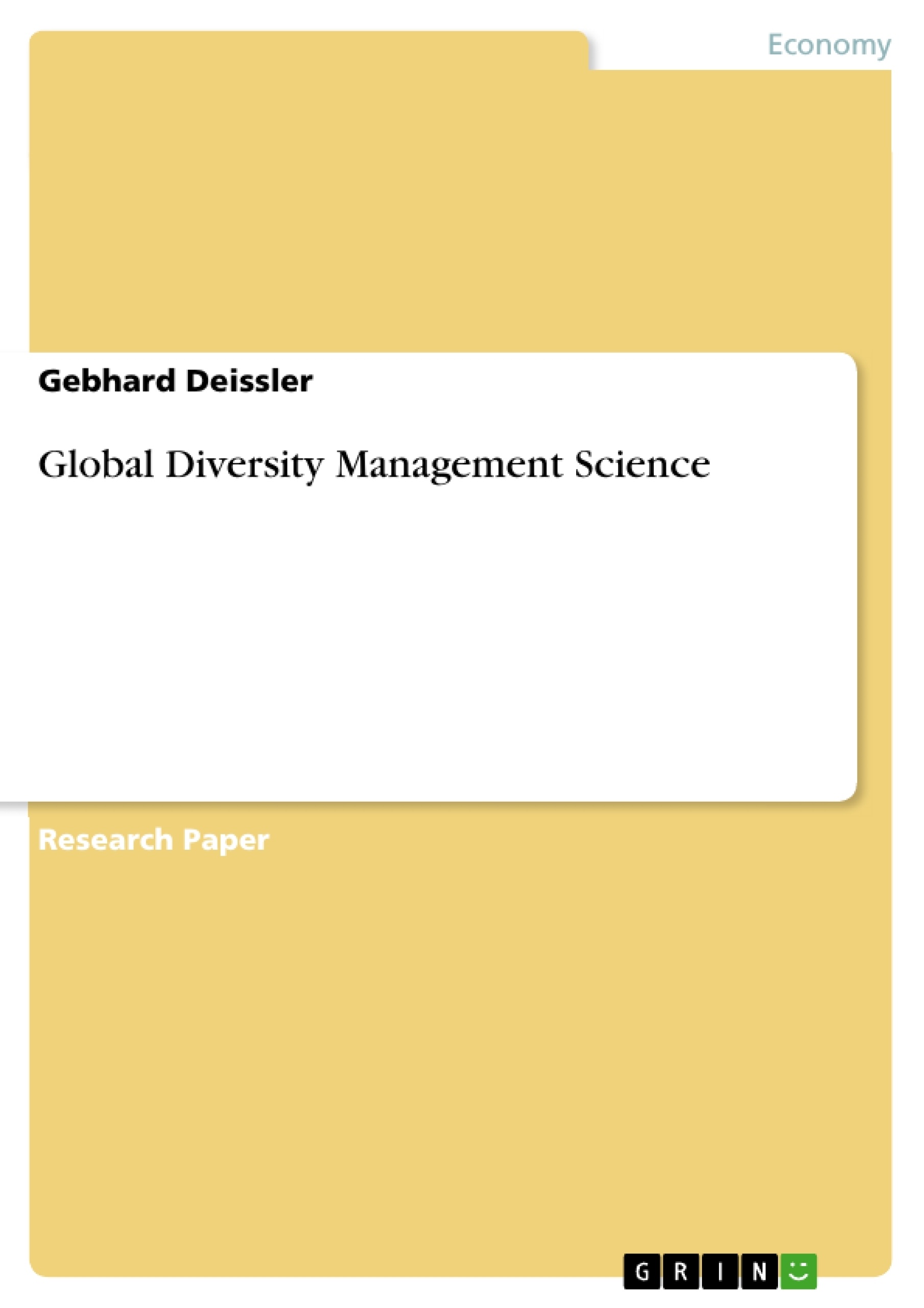The global diversity management challenge's importance in our time requires a scientific approach to be dealt with effectively that does not preclude human creativity and ethics either.
Inhaltsverzeichnis (Table of Contents)
- Part 1: Foundation of a Global Diversity Management Science
- The completion of the intercultural edifice
- Design of a scientifically-based diversity-integrative transcultural profiler
- The state of the intercultural art and science: On human relativity in intercultural research
- Enhancing the intercultural art and science: Sources, models and the achievement of supreme cultural intelligence
- Summary of Inter-/Transcultural Management Instruments
- Part 2: Grundlagen einer globalen Diversitätsmanagementwissenschaft
- Formulierung eines Kultur-Management Gesetzes
- Der Diagnostiker-Profiler: Das 3-D-12-Oktaven-Dome Transcultural Management Mode
- Die Optimierung des Modells
- Part 3: The Need of Acquiring Full Human Diversity Awareness and the Imperative of Managing It
- Finding the Space Age Intercultural Formula. Managing the Human Matrix in the Intercultural Interfacing Process
- Identity and Relationship as the Basis of Culture and Civilisation
- The Identity War: Diversity, Reciprocity and the Ethics of Peaceful Coexistence
- The Cosmic Dimension
- Child of the Universe. Oneness
- A Glance at German Lands
- Cultural Healing of Germany
- Identity, Culture and Freedom
- The Relationship between Culture Area and Geopolitical Space
Zielsetzung und Themenschwerpunkte (Objectives and Key Themes)
This text aims to lay the foundation for a global diversity management science, integrating intercultural and transcultural perspectives. It seeks to provide a comprehensive framework for navigating the complexities of cultural differences and fostering effective intercultural interaction.
- The development of a scientifically-grounded transcultural profiler for understanding and managing cultural diversity.
- The importance of cultural intelligence and the achievement of "supreme cultural intelligence" for navigating intercultural contexts.
- The formulation of a cultural management law as a foundation for a global diversity management science.
- The examination of identity and relationships as foundational elements of culture and civilization.
- The exploration of the ethical and practical implications of managing cultural diversity in a globalized world.
Zusammenfassung der Kapitel (Chapter Summaries)
- Part 1: "Foundation of a Global Diversity Management Science" focuses on establishing a theoretical framework for understanding and managing cultural diversity. It introduces the concept of "supreme cultural intelligence" and examines the historical evolution of intercultural research.
- Part 2: "Grundlagen einer globalen Diversitätsmanagementwissenschaft" delves deeper into the development of a cultural management law, highlighting the need for a systematic approach to managing cultural differences. This section presents the "3-D-12-Oktaven-Dome Transcultural Management Mode" as a diagnostic tool.
- Part 3: "The Need of Acquiring Full Human Diversity Awareness and the Imperative of Managing It" addresses the practical implications of intercultural interaction. This section explores the relationship between identity, culture, and freedom, as well as the ethical considerations of cultural diversity in the context of globalization.
Schlüsselwörter (Keywords)
Key terms and concepts explored in this work include: intercultural management, transcultural management, cultural intelligence, diversity management, cultural profiling, cultural awareness, cultural identity, cultural healing, globalization, and ethical considerations.
Frequently Asked Questions
What is Global Diversity Management Science?
It is a scientific approach to managing cultural differences that integrates intercultural research with ethics and human creativity.
What is the '3-D-12-Oktaven-Dome' model?
This is a diagnostic transcultural management tool used to profile and manage human matrix interactions in global contexts.
How is cultural intelligence defined in this work?
The work aims for "supreme cultural intelligence," which involves deep awareness of human relativity and transcultural proficiency.
What is the 'Identity War' mentioned in the text?
It refers to the conflicts arising from diversity and reciprocity, emphasizing the need for ethics of peaceful coexistence in a globalized world.
Does the science include a cosmic dimension?
Yes, the text explores the 'Cosmic Dimension' and the concept of being a 'Child of the Universe' to foster human oneness.
- Citar trabajo
- D.E.A./UNIV. PARIS I Gebhard Deissler (Autor), 2012, Global Diversity Management Science, Múnich, GRIN Verlag, https://www.grin.com/document/194334



